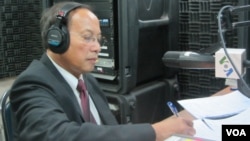PHNOM PENH —
A spokesman for the Cambodian government on Friday chided Radio Free Asia and the English-language Cambodia Daily, claiming recent reports by the organizations were unprofessional.
The spokesman, Phay Siphan, blasted the Cambodia Daily for a story on foreign ships that are “sold” Cambodian flags and RFA for a story that said Prime Minister Hun Sen “admitted” Cambodia cannot reduce its gap between rich and poor.
“The word ‘sold’ is considered an attack, and an entire fiction,” Phay Siphan told reporters at a press conference Friday. “Did the prime minister say he ‘admits’? Where are your codes of ethics? A journalist does not add personal ideas or words of attack to a story.”
In response, RFA said it had accurately quoted the prime minister and stood by its story. Referencing a letter from the Cambodian government, the organization said there was “no specific mention of what error was made” and that the letter “offers no evidence of how this report is factually incorrect.”
There was no immediate response from the Cambodia Daily. However, Cambodia is notorious for its so-called “flags of convenience,” a process whereby foreign ships find easy registration under the Cambodian flag. Ships flying such flags are often found to be unsafe or to be carrying illicit cargo, including weapons or narcotics.
Phay Siphan said Friday his statements were a only a verbal “warning” to the news organizations. But he said repeated transgressions could bring about a lawsuit.
Moeun Chhean Nariddh, director of the Cambodia Institute for Media Studies, said the recent government response to independent media institutions was typical. But he said news reporters should pay attention to some criticisms and be able to improve their ethics.
The spokesman, Phay Siphan, blasted the Cambodia Daily for a story on foreign ships that are “sold” Cambodian flags and RFA for a story that said Prime Minister Hun Sen “admitted” Cambodia cannot reduce its gap between rich and poor.
“The word ‘sold’ is considered an attack, and an entire fiction,” Phay Siphan told reporters at a press conference Friday. “Did the prime minister say he ‘admits’? Where are your codes of ethics? A journalist does not add personal ideas or words of attack to a story.”
In response, RFA said it had accurately quoted the prime minister and stood by its story. Referencing a letter from the Cambodian government, the organization said there was “no specific mention of what error was made” and that the letter “offers no evidence of how this report is factually incorrect.”
There was no immediate response from the Cambodia Daily. However, Cambodia is notorious for its so-called “flags of convenience,” a process whereby foreign ships find easy registration under the Cambodian flag. Ships flying such flags are often found to be unsafe or to be carrying illicit cargo, including weapons or narcotics.
Phay Siphan said Friday his statements were a only a verbal “warning” to the news organizations. But he said repeated transgressions could bring about a lawsuit.
Moeun Chhean Nariddh, director of the Cambodia Institute for Media Studies, said the recent government response to independent media institutions was typical. But he said news reporters should pay attention to some criticisms and be able to improve their ethics.







